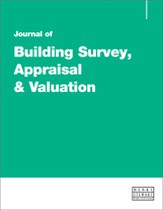The Community Infrastructure Levy and the implications for surveyors
Abstract
This paper concentrates on the growing prevalence of CIL among local authorities in England and Wales, and the implications that the levy has for surveyors. The role that the surveyor has to play at the outset of a potential development scheme is fundamental in assessing project costs and the viability and deliverability of project proposals. It is at this embryonic stage of a development scheme that a sound understanding of CIL is pivotal to ensure that no major financial implications are realised later on in a project's time plan. The surveyor also has a vital role to play in setting the CIL rates in the first instance, with increased transparency between surveyors and the local authority fundamental to delivering growth and financing infrastructure provision.
The full article is available to subscribers to the journal.
Citation
Bennett, Luke (2016, March 1). The Community Infrastructure Levy and the implications for surveyors. In the Journal of Building Survey, Appraisal & Valuation, Volume 4, Issue 4. https://doi.org/10.69554/FKCX6091.Publications LLP
